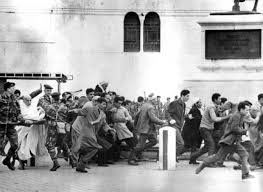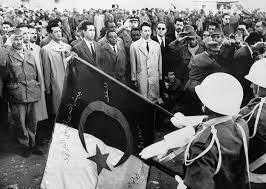Herein, this post discusses the political history of Algeria, their politics, political status and independence of Algeria.
Introduction
The creation of the People’s Democratic Republic of Algeria was formally proclaimed on September 25, 1962. The following day, after being named premier, a cabinet that linked the leadership of the three power bases-the army, the party, and the government was formed. However this ambitions and authoritarian tendencies ultimately led the triumvirate to unravel and provoked increasing discontent among Algerians.
Politics in Algeria
Politics of Algeria takes place in a framework of a constitutional semi-presidential republic, whereby the President of Algeria is head of state while the Prime Minister of Algeria is the head of government. Executive power is exercised by the government. Legislative power is vested in both the government and the two chambers of parliament, the People’s National Assembly and the Council of the Nation. A legacy of Algeria’s bloody War of Independence from France (where an estimated 1.5 million Algerians were killed) is a powerful military and security apparatus that put a high value on secrecy Since 1988, parties other than the ruling FLN have been allowed and multiparty elections have been held, but freedom of political speech, protest and assembly is circumscribed and the 2014 presidential election was boycotted by major opposition parties. Algeria has been called a “controlled democracy”, or a state where the military and “a select group” of unelected civilians—reportedly known to Algerians as “le pouvoir” (“the power”)—make major decisions, such as who should be president.
Political History
Since the early 1990s, a shift from a socialist to a free market economy has been ongoing with official support.
In keeping with its amended Constitution, the Algerian Government espouses participatory democracy and free-market competition. The government has stated that it will continue to open the political process and encourage the creation of political institutions. More than 40 political parties, representing a wide segment of the population, are currently active in Algerian national politics. The most recent legislative election was 2012. President Bouteflika pledged to restructure the state as part of his overall reform efforts. However, no specifics are yet available as to how such reforms would affect political structures and the political process itself.
In the 2002 elections, there were 17,951,127 eligible voters, and 8,288,536 of them actually voted which made a turnout of 46.17%. Out of the ballots cast, there were 867,669 void ballots according to the Interior ministry and 7,420,867 which went to the various candidates.

Independent Algeria
The Algerian independence referendum was held in French Algeria on 1 July 1962, passing with 99.72% of the vote. As a result, France declared Algeria independent on 3 July. On 8 September 1963, the first Algerian constitution was adopted by nationwide referendum under close supervision by the National Liberation Front (FLN). Later that month, Ahmed Ben Bella was formally elected the first president of Algeria for a five-year term after receiving support from the FLN and the military, led by Colonel Houari Boumédiène.
Read: STATES AND TERRITORIES OF THE UNITED STATES (OREGON)
However, the war for independence and its aftermath had severely disrupted Algeria’s society and economy. In addition to the destruction of much of Algeria’s infrastructure, an exodus of the upper-class French and European colons from Algeria deprived the country of most of its managers, civil servants, engineers, teachers, physicians, and skilled workers. The homeless and displaced numbered in the hundreds of thousands, many suffering from illness, and some 70 percent of the workforce was unemployed. The months immediately following independence witnessed the pell-mell rush of Algerians and government officials to claim the property and jobs left behind by the European colons.
The military played an important role in Ben Bella’s administration. Since the president recognized the role that the military played in bringing him to power, he appointed senior military officers as ministers and other important positions within the new state, including naming Colonel Boumédiène as defense minister. These military officials played a core role into implementing the country’s security and foreign policy.
Under the new constitution, Ben Bella’s presidency combined the functions of chief of state and head of government with those of supreme commander of the armed forces. He formed his government without needing legislative approval and was responsible for the definition and direction of its policies. There was no effective institutional check on the president’s powers. As a result, opposition leader Hocine Aït-Ahmed quit the National Assembly in 1963 to protest the increasingly dictatorial tendencies of the regime and formed a clandestine resistance movement, the Socialist Forces Front (Front des Forces Socialites—FFS), dedicated to overthrowing the Ben Bella regime by force.
Political status
1516-1567
In between 1516 and 1567, the rulers of the Regency were chosen by the Ottoman sultan. During the first few decades, Algiers was completely aligned with the Ottoman Empire, although it later gained a certain level of autonomy as it was the westernmost province of the Ottoman Empire, and administering it directly would have been problematic.
1567-1710
During this period a form of dual leadership was in place, with the Aghas sharing power and influence with a Pasha appointed by the Ottoman sultan from Constantinople. After 1567, the Deys became the main leaders of the country, although the Pashas still retained some power.]
1710-1830
After a coup by Baba Ali Chaouch, the political situation of Algiers became complicated.


